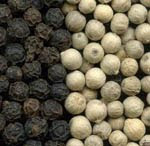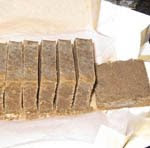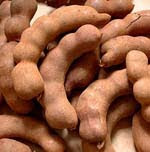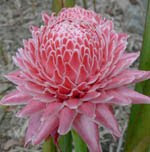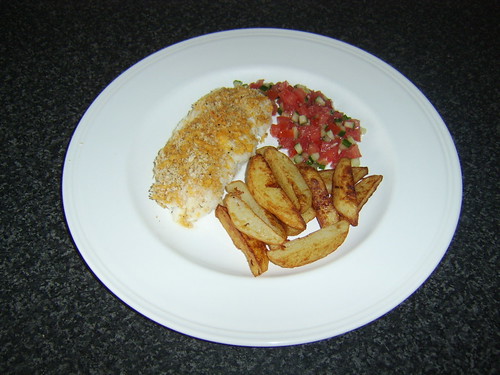
Cod and chips is something which is sold in the UK in fish and chip shops, or perhaps as a traditional pub lunch. The cod will come more often than not in the form of cod fillets, deep fried in batter. Although I do love cod and chips - or haddock and chips, as is more common here in Scotland - served in this way, I genuinely very much prefer fish cooked in a healthier fashion such as that below, not just for its more healthful properties but because of the fact that I truly believe it is much tastier.
I have served the cod and chips in this instance with a basic salsa. The salsa ingredient quantities will provide for about four servings of cod and chips, or simply refrigerate any excess and enjoy it on sandwiches, or with other accompaniments over the next day or two.
Ingredients
Salsa
2 large beef tomatoes
4" cucumber
1 clove of garlic
1 red chilli pepper
1 tbsp extra virgin olive oil
Splash of white wine vinegar
Salt and pepper to taste
Cod and Chips (Per Person)
1 large cod loin fillet
1 large potato
2oz cheddar cheese
2 tbsp fresh breadcrumbs
Freshly ground black pepper
Method
The method I use to prepare chips has appeared on this blog several times before. In order to avoid repetition, the full instructions can be found by clicking here. Alternatively, they can be prepared by your own chosen method, particularly if time is short.
It is important, however, to try to prepare the salsa a couple of hours in advance, in order to let the flavours infuse. This is done simply by deeseeding the tomato, cucumber and chilli, peeling the garlic, finely chopping everything and mixing all the ingredients thoroughly together in a glass bowl. The bowl should then be covered with clingfilm and refrigerated until required. Avoid using a plastic bowl here, as the flavours may actually permeate the plastic.
The cooking time for the cod fillets will vary depending upon their size. The one which I have cooked here took about three minutes each side over a medium heat, fried in a little sunflower oil. It should be possible to see from the side of the fillet when it is cooked half way through, at which point it should be carefully turned, using a spatula or fish slice.
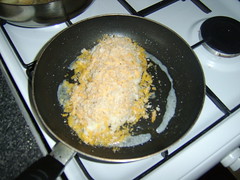 While the cod is gently frying, the cheese should be grated and the breadcrumbs prepared. They should be mixed together and seasoned up with black pepper. When the fish is cooked the breadcrumb and cheese mix should be scattered thickly over the top as shown in the photograph to the right. There is no need to take time to do this carefully, to try to ensure decent presentation - that can be attended to at the time of plating up, simply by scraping the excess bread and cheese away from around the edges of the fillet with the spatula, prior to lifting it carefully from the pan.
While the cod is gently frying, the cheese should be grated and the breadcrumbs prepared. They should be mixed together and seasoned up with black pepper. When the fish is cooked the breadcrumb and cheese mix should be scattered thickly over the top as shown in the photograph to the right. There is no need to take time to do this carefully, to try to ensure decent presentation - that can be attended to at the time of plating up, simply by scraping the excess bread and cheese away from around the edges of the fillet with the spatula, prior to lifting it carefully from the pan.The frying pan should then be placed under a hot, overhead grill for a couple of minutes, until the cheese melts and the breadcrumbs begin to crisp. The cod may then be plated along with the chips and salsa and served.
It is not just cod which is delicious served in this way. Any firm fleshed, white fish - such as perhaps monkfish - would be delicious prepared in this fashion, though more delicate fish such as whiting or particularly lemon sole would be likely to be overpowered.
More Great Fish and Seafood Recipes for you to Enjoy
English chef Rick Stein is my favourite fish and seafood chef. Although there are a great many talented chefs of this type on TV and around the world, it is his genuine love of the produce which shines through for all to see and the simplicity with which he cooks the delicate ingredients so as not to overwhelm their flavours which makes Rick Stein's fish and seafood recipes so special for me.
Below are a couple of suggestions from Amazon.com and Amazon.co.uk through which you can prepare fish and seafood recipes in the delicious fashions described by Rick Stein.












